
Saxony-Anhalt is a state of Germany, bordering the states of Brandenburg, Saxony, Thuringia and Lower Saxony. It covers an area of 20,451.7 square kilometres (7,896.4 sq mi) and has a population of 2.17 million inhabitants, making it the 8th-largest state in Germany by area and the 11th-largest by population. Its capital and largest city is Magdeburg.

Schönebeck, officially Schönebeck (Elbe), is a town in the district of Salzlandkreis, in Saxony-Anhalt, Germany. It is situated on the left bank of the Elbe, approx. 14 kilometres southeast of Magdeburg.
Westliche Börde is a Verbandsgemeinde in the Börde district in Saxony-Anhalt, Germany. Before 1 January 2010, it was a Verwaltungsgemeinschaft. It is situated approximately 35 km southwest of Magdeburg, in the western part of the Magdeburger Börde. The seat of the Verbandsgemeinde is in Gröningen.

Genthin is a town in Jerichower Land district, in Saxony-Anhalt, Germany.

Barby is a town in the Salzlandkreis district, in Saxony-Anhalt, Germany. It is situated on the left bank of the River Elbe, near the confluence with the Saale, approx. 25 km (16 mi) southeast of Magdeburg. Since an administrative reform of 1 January 2010 it comprises the former municipalities of the Verwaltungsgemeinschaft Elbe-Saale, except for Gnadau, that joined Barby in September 2010. The Barby Ferry, a reaction ferry across the Elbe, links Barby with Zerbst-Walternienburg.

Hohenmölsen is a town in the Burgenlandkreis district, in Saxony-Anhalt, Germany. It is situated approximately 10 km southeast of Weißenfels, and 27 km southwest of Leipzig. The town Hohenmölsen consists of Hohenmölsen proper and the Ortschaften Granschütz, Taucha, Webau, Werschen and Zembschen.
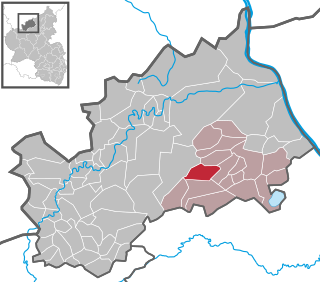
Spessart is a municipality in the district of Ahrweiler, in Rhineland-Palatinate, Germany.
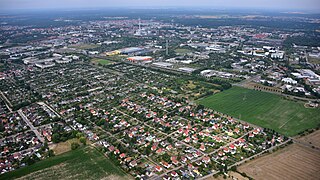
Dessau-Roßlau is a kreisfreie Stadt in the German state of Saxony-Anhalt. It is situated at the confluence of the rivers Elbe and Mulde. The town was formed by merger of the towns of Dessau and Roßlau as part of the 2007 regional boundary reform of Saxony-Anhalt. The reform involved a reduction in the number of rural districts in Sachsen-Anhalt from 21 to 11, in anticipation of a continued population decline.
Tromsdorf is a village and a former municipality in the Burgenlandkreis district, in Saxony-Anhalt, Germany. Since 1 July 2009, it is part of the town Eckartsberga.

Hohenberg-Krusemark is a municipality in the district of Stendal, in Saxony-Anhalt, Germany. It is about 17 km North East of the town Stendal.
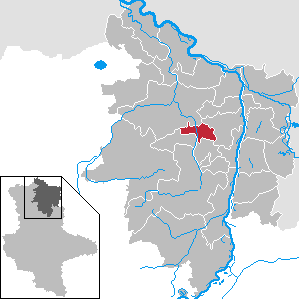
Goldbeck is a municipality in the district of Stendal, in Saxony-Anhalt, Germany. In January 2009 it absorbed the former municipality Bertkow.

The old states of Germany is a jargon referring to the ten of the sixteen states of the Federal Republic of Germany (FRG) that were part of West Germany and that unified with the eastern German Democratic Republic's 5 states, which are given the contrasting term new states of Germany. Usage of this terminology usually excludes one other state, Berlin, conterminous with the capital city of the reunified nation which used to be divided, with its western part linked with West Germany.

Raguhn-Jeßnitz is a town in the district of Anhalt-Bitterfeld, in Saxony-Anhalt, Germany. It was formed on 1 January 2010 by the merger of the former municipalities Altjeßnitz, Jeßnitz, Marke, Raguhn, Retzau, Schierau, Thurland and Tornau vor der Heide. These 8 former municipalities are now Ortschaften or municipal divisions of the town Raguhn-Jeßnitz.
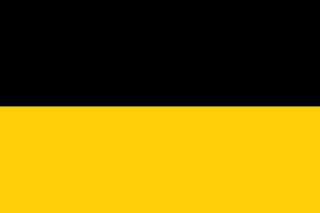
The State of Saxony-Anhalt was a subdivision of the Soviet occupation zone and state of East Germany which broadly corresponds with the present-day German state Saxony-Anhalt. After the retreat of the US troops from the Western parts - following the agreements of the Yalta Conference - it was formed as administrative division called Province of Saxony by the Soviet Military Administration in Germany (SMAD) in July 1945. The province was a re-establishment of the Province of Saxony which existed in Prussia from 1816 to 1944. On 1 July 1944, the Province of Saxony was divided along the lines of its three government districts of Halle-Merseburg, Magdeburg and Erfurt. The two provinces became part of the new state including small parts of Thuringia (Allstedt) and Soviet-occupied parts of Anhalt (Dessau) and Brunswick. Following the first election for the Landtag in October 1946, the state was renamed to Province of Saxony-Anhalt on the same day. With the abolition of Prussia in February 1947, it was named State of Saxony-Anhalt. Compared to the administrative divisions of Nazi Germany, it comprised the Gaue Magdeburg-Anhalt, Halle-Merseburg and small parts of Southern Hanover-Brunswick and Thuringia.

State elections were held in the Soviet occupation zone of Germany on 20 October 1946 to elect the state legislatures of Mecklenburg-Vorpommern, Brandenburg, Saxony, Saxony-Anhalt and Thuringia. They were the only elections held in the future territory of East Germany before the establishment of the German Democratic Republic in 1949, and the only free and fair elections in that part of Germany between 1932 and the Peaceful Revolution.
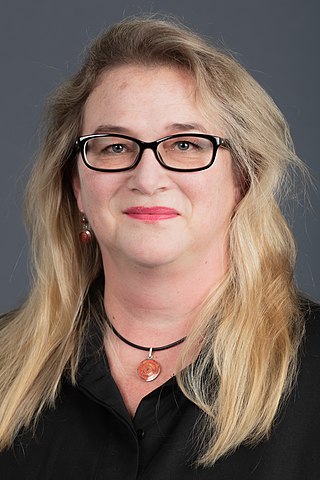
Katrin Budde is a German politician of the Social Democratic Party (SPD), who has been serving as a member of the Bundestag from the state of Saxony-Anhalt since 2017.
Klimaliste is the name of various microparties and voter groups in Germany that advocate climate protection measures to meet the 1.5 °C IPCC and Paris Agreement warming limit target. They see themselves as a grassroots movement.

WiR2020 is a minor party in Germany aimed primarily at opponents of vaccinations.
The Action Party for Animal Welfare is a minor political party in Germany.















